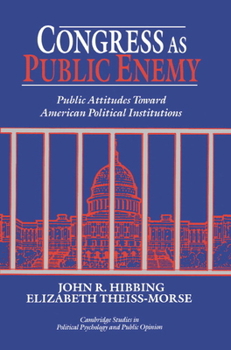Congress as Public Enemy: Public Attitudes Toward American Political Institutions
(Part of the Cambridge Studies in Public Opinion and Political Psychology Series)
Select Format
Select Condition 
Book Overview
This timely book describes and explains the American people's alleged hatred of their own branch of government, the U.S. Congress. Focus group sessions held across the country and a specially designed national survey indicate that much of the negativity is generated by popular perceptions of the processes of governing visible in Congress. But Hibbing and Theiss-Morse conclude that the public's unwitting desire to reform democracy out of a democratic...
Format:Paperback
Language:English
ISBN:0521483360
ISBN13:9780521483360
Release Date:September 1995
Publisher:Cambridge University Press
Length:208 Pages
Weight:0.65 lbs.
Dimensions:0.5" x 6.0" x 9.0"
Customer Reviews
1 rating
Do we hate Congress and if so, why?
Published by Thriftbooks.com User , 24 years ago
Years ago, Richard Fenno introduced the idea of the `congressional paradox'---a phenomenon explaining that although a majority of Americans distrust Congress as an institution, that negative sentiment, however, did not extend to individual attitudes about one's own congressional representative. In Congress as Public Enemy, Hibbing and Theiss-Morse investigate the causes of and the reasoning behind public disillusionment toward the United States' top legislative body. Along the way, the authors discover dissatisfaction with Congress comes not only from the viewpoint that Congress is overprofessionalized and coddled by the hands of special interests, but Americans contain a wide discontent for the legislative processes. Interestingly, the authors observe this finding as troublesome. Authors state, "People profess a devotion to democracy in the abstract but have little or no appreciation for what a practicing democracy invariably brings with it...People do not wish to see uncertainty conflicting opinions, long debate, competing interests, confusion, bargaining, and compromised, imperfect decisions. They want government to do its job quietly and efficiently...In short, we submit, they often seek a patently unrealistic form of democracy." (Pg. 147) I believe we must ask ourselves is this true discontent or misunderstanding? Can civic education increase appreciation for the process? Does this discontent toward the process extend to public perceptions of state legislatures? A well researched and written work! Strongly recommended for anyone interested in the study of political psychology.





